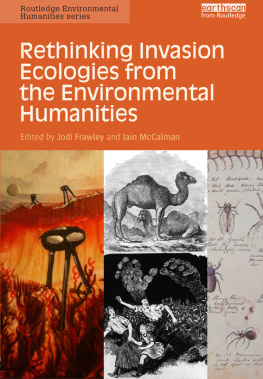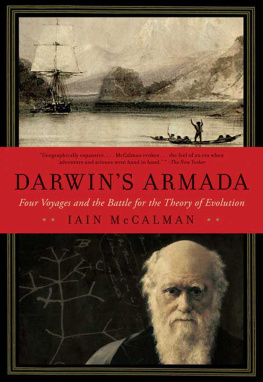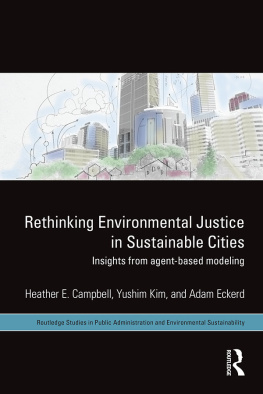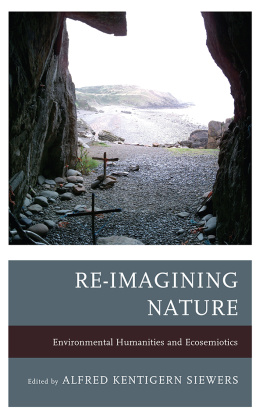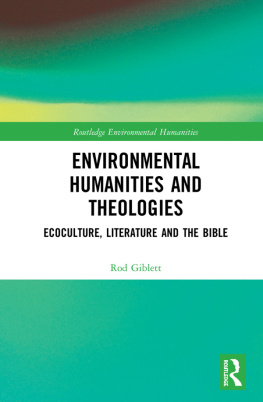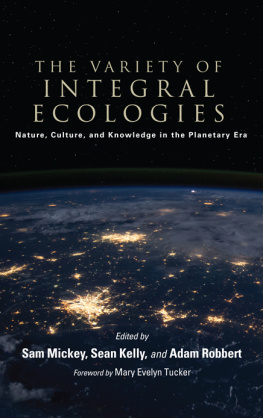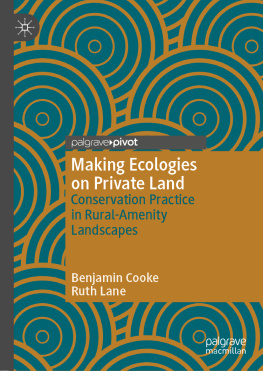McCalman - Rethinking Invasion Ecologies from the Environmental Humanities
Here you can read online McCalman - Rethinking Invasion Ecologies from the Environmental Humanities full text of the book (entire story) in english for free. Download pdf and epub, get meaning, cover and reviews about this ebook. publisher: Taylor and Francis, genre: Politics. Description of the work, (preface) as well as reviews are available. Best literature library LitArk.com created for fans of good reading and offers a wide selection of genres:
Romance novel
Science fiction
Adventure
Detective
Science
History
Home and family
Prose
Art
Politics
Computer
Non-fiction
Religion
Business
Children
Humor
Choose a favorite category and find really read worthwhile books. Enjoy immersion in the world of imagination, feel the emotions of the characters or learn something new for yourself, make an fascinating discovery.
Rethinking Invasion Ecologies from the Environmental Humanities: summary, description and annotation
We offer to read an annotation, description, summary or preface (depends on what the author of the book "Rethinking Invasion Ecologies from the Environmental Humanities" wrote himself). If you haven't found the necessary information about the book — write in the comments, we will try to find it.
McCalman: author's other books
Who wrote Rethinking Invasion Ecologies from the Environmental Humanities? Find out the surname, the name of the author of the book and a list of all author's works by series.
Rethinking Invasion Ecologies from the Environmental Humanities — read online for free the complete book (whole text) full work
Below is the text of the book, divided by pages. System saving the place of the last page read, allows you to conveniently read the book "Rethinking Invasion Ecologies from the Environmental Humanities" online for free, without having to search again every time where you left off. Put a bookmark, and you can go to the page where you finished reading at any time.
Font size:
Interval:
Bookmark:
Research from a humanist perspective has much to offer in interrogating the social and cultural ramifications of invasion ecologies. The impossibility of securing national boundaries against accidental transfer and the unpredictable climatic changes of our time have introduced new dimensions and hazards to this old issue. Written by a team of international scholars, Rethinking Invasion Ecologies from the Environmental Humanities allows us to rethink the impact on national, regional or local ecologies of the deliberate or accidental introduction of foreign species, plant and animal.
Modern environmental approaches that treat nature with nave realism or mobilise it as a moral absolute, unaware or unwilling to accept that it is informed by specific cultural and temporal values, are doomed to fail. Instead, this book shows that we need to understand the complex interactions of ecologies and societies in the past, present and future over the Anthropocene, in order to address problems of the global environmental crisis. It demonstrates how humanistic methods and disciplines can be used to bring fresh clarity and perspective to this long-vexed aspect of environmental thought and practice.
Students and researchers in environmental studies, invasion ecology, conservation biology, environmental ethics, environmental history and environmental policy will welcome this major contribution to environmental humanities.
Jodi Frawley is a Discovery Early Career Researcher Award Fellow in the Department of Gender and Cultural Studies, University of Sydney, Australia.
Iain McCalman is a Professorial Research Fellow in History, University of Sydney. He is Co-Director of the Sydney University Environment Institute, Australia.
Editorial Board
Christina Alt, St Andrews University, UK
Alison Bashford, University of Cambridge, UK
Peter Coates, University of Bristol, UK
Thom van Dooren, University of New South Wales, Australia
Georgina Endfield, University of Nottingham, UK
Jodi Frawley, University of Sydney, Australia
Andrea Gaynor, The University of Western Australia, Australia
Tom Lynch, University of Nebraska, Lincoln, USA
Jennifer Newell, American Museum of Natural History, New York, US
Simon Pooley, Imperial College London, UK
Sandra Swart, Stellenbosch University, South Africa
Ann Waltner, University of Minnesota, US
Paul Warde, University of East Anglia, UK
Jessica Weir, University of Western Sydney, Australia
International Advisory Board
William Beinart, University of Oxford, UK
Jane Carruthers, University of South Africa, Pretoria, South Africa
Dipesh Chakrabarty, University of Chicago, USA
Poul Holm, Trinity College, Dublin, Republic of Ireland
Shen Hou, Renmin University of China, Beijing
Rob Nixon, University of Wisconsin-Madison, USA
Pauline Phemister, Institute of Advanced Studies in the Humanities, University of Edinburgh, UK
Deborah Bird Rose, University of New South Wales, Australia
Sverker Srlin, KTH Environmental Humanities Laboratory, Royal Institute of Technology, Stockholm, Sweden
Helmuth Trischler, Deutsches Museum, Munich and Co-Director, Rachel Carson Centre, LMU Munich University, Germany
Mary Evelyn Tucker, Yale University, USA
Kirsten Wehner, Head Curator, People and the Environment, National Museum of Australia
The Routledge Environmental Humanities series is an original and inspiring venture recognising that todays world agricultural and water crises, ocean pollution and resource depletion, global warming from greenhouse gases, urban sprawl, overpopulation, food insecurity and environmental justice are all crises of culture.
The reality of understanding and finding adaptive solutions to our present and future environmental challenges has shifted the epicentre of environmental studies away from an exclusively scientific and technological framework to one that depends on the human-focused disciplines and ideas of the humanities and allied social sciences.
We thus welcome book proposals from all humanities and social sciences disciplines for an inclusive and interdisciplinary series. We favour manuscripts aimed at an international readership and written in a lively and accessible style. The readership comprises scholars and students from the humanities and social sciences and thoughtful readers concerned about the human dimensions of environmental change.
Rethinking Invasion Ecologies from the Environmental Humanities
Jodi Frawley and Iain McCalman
The Broken Promise of Agricultural Progress
An environmental history
Cameron Muir

First published 2014
by Routledge
2 Park Square, Milton Park, Abingdon, Oxon, OX14 4RN
and by Routledge
711 Third Avenue, New York, NY 10017
Routledge is an imprint of the Taylor & Francis Group, an informa business
2014 selection and editorial material, Jodi Frawley and Iain McCalman; individual chapters, the contributors
The right of Jodi Frawley and Iain McCalman to be identified as authors of the editorial material, and of the individual authors as authors of their contributions, has been asserted by them in accordance with sections 77 and 78 of the Copyright, Designs and Patents Act 1988.
All rights reserved. No part of this book may be reprinted or reproduced or utilised in any form or by any electronic, mechanical, or other means, now known or hereafter invented, including photocopying and recording, or in any information storage or retrieval system, without permission in writing from the publishers.
British Library Cataloguing in Publication Data
A catalogue record for this book is available from the British Library
Library of Congress Cataloging-in-Publication Data
Rethinking invasion ecologies from the environmental humanities / edited by Jodi Frawley and Iain McCalman.
pages cm. (Routledge environmental humanities)
Includes bibliographical references and index.
1. Biological invasionsSocial aspects. 2. Introduced organismsSocial aspects. 3. Science and the humanities. I. Frawley, Jodi, author, editor of compilation. II. McCalman, Iain, autor, editor of compilation.
QH353.R48 2014
577.18dc23
2013033346
ISBN: 978-0-415-71656-7 (hbk)
ISBN: 978-0-415-71657-4 (pbk)
ISBN: 978-1-315-87964-2 (ebk)
If Charles Eltons classic, The Ecology of Invasions, changed forever the way we thought about plants and animals, so too Frawley and McCalman's book is a major turning point. Rethinking Invasion Ecologies is a bold set of essays. Assimilation, migration, resilience, habitat, natives all the conceptual ground that ecology, history and politics share is incisively explored. From crocodiles to humans, cane toads to prickly pears, in new worlds and old, this is environmental humanities at its sharpest.
Alison Bashford, University of Cambridge, UK
This exciting, timely and important collection illuminates the complex range of human values and actions that emerge from multi-disciplinary reflection. Often construed as relevant only to biologists, by adapting a cultural and historical perspective the innovative scholarship of
Font size:
Interval:
Bookmark:
Similar books «Rethinking Invasion Ecologies from the Environmental Humanities»
Look at similar books to Rethinking Invasion Ecologies from the Environmental Humanities. We have selected literature similar in name and meaning in the hope of providing readers with more options to find new, interesting, not yet read works.
Discussion, reviews of the book Rethinking Invasion Ecologies from the Environmental Humanities and just readers' own opinions. Leave your comments, write what you think about the work, its meaning or the main characters. Specify what exactly you liked and what you didn't like, and why you think so.

